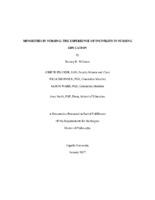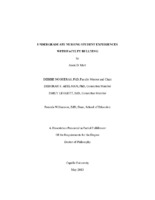Minorities in nursing: The experience of incivility in nursing education
View File(s)
Visitor Statistics
Visits vs Downloads
Visitors - World Map
Top Visiting Countries
| Country | Visits |
|---|
Top Visiting Cities
| City | Visits |
|---|
Visits (last 6 months)
Downloads (last 6 months)
Popular Works for Williams, Tammy by View
| Title | Page Views |
|---|
Popular Works for Williams, Tammy by Download
| Title | Downloads |
|---|
View Citations
Citations
The aim of this phenomenological study was to explore the lived experiences of minority nursing students with nursing faculty’s incivility. Six students of varied ethnicity participated in the study. The guiding theoretical framework for the study included Roy’s adaptation model and Clark’s conceptual model for fostering civility in nursing education. Data were collected through semi-structured interviews. Colaizzi’s (1978) phenomenological method for qualitative research was used to guide the data analysis of the student’s experiences with faculty incivility. Seven themes emerged related to nursing faculty uncivil behaviors including: learning environment, unfair treatment, student faculty relationships, demeaning/belittling, emotional impact, adaptive behaviors, and pressure to conform. Implications of this study indicate faculty can meet the needs of minority students and improve relationships leading to higher success in nursing education by understanding the perceptions of students experiencing incivility. Nurse educators need to be aware of differences in social integration, sociocultural context, and learning among minority nursing students. Future research should focus on faculty perceptions of working with minority nursing students and the issues within nursing education. An additional area for future research should be minority nursing faculty working with diverse student populations.
This dissertation has also been disseminated through the ProQuest Dissertations and Theses database. Dissertation/thesis number: 10256913; ProQuest document ID: 1879722896. The author still retains copyright.
This item has not gone through this repository's peer-review process, but has been accepted by the indicated university or college in partial fulfillment of the requirements for the specified degree.
| Type | Dissertation |
| Acquisition | Proxy-submission |
| Review Type | None: Degree-based Submission |
| Format | Text-based Document |
| Evidence Level | Phenomenology |
| Research Approach | Qualitative Research |
| Keywords | Minority Nurses; Nursing Incivility; Faculty Bullying |
| CINAHL Subject(s) | Students, Minority; Faculty, Nursing; Incivility; Students, Minority--Psychosocial Factors |
| Grantor | Capella University |
| Advisor | Pilcher, Jobeth |
| Level | PhD |
| Year | 2017 |
All rights reserved by the author(s) and/or publisher(s) listed in this item record unless relinquished in whole or part by a rights notation or a Creative Commons License present in this item record.
All permission requests should be directed accordingly and not to the Sigma Repository.
All submitting authors or publishers have affirmed that when using material in their work where they do not own copyright, they have obtained permission of the copyright holder prior to submission and the rights holder has been acknowledged as necessary.
Related items
Showing items related by title, author, creator and subjects.
-
Undergraduate nursing student experiences with faculty bullying
Mott, Jason D.Incivility and bullying in nursing education has become an area of increased interest. Incivility literature has focused primarily on student-to-faculty incivility. Less focus has been placed on faculty-to-student bullying. ... -
Exploring incivility among nursing and health science students: A descriptive study
Smith, Diane LouiseIncivility has infiltrated our institutions of higher learning as well as the world of nursing. All too familiar in nursing is the phrase “eating their young,” which aptly describes how nurses treat other nurses, ... -
Breaking the cycle of bullying in nursing: Emerging themes
Conner, Debra J. Nogueras; Adelman, Deborah S. (12/19/2013)Bullying, horizontal, or lateral violence, and incivility are all terms that are used to describe aggressive behaviors seen in nursing practice between nurses. How and why these behaviors arise has been studied in ... -
Factors associated with peer violence among elementary, middle and high school students
Perron, Tracy J.The purpose of this study was to examine the relationships among perceived school climate, self-reported psychosomatic symptoms, visits to the school nurse for reported psychosomatic symptoms and reports of bullying behaviors ... -
American nursing faculty's experiences with international, ELL, and ESL nursing students in BSN degree programs
Thyssen, Rosalynn WilliamsThis basic qualitative dissertation research study addressed the question of how American nursing faculty describe their experiences with international, English language learner (ELL), and English as a second language (ESL) ...





